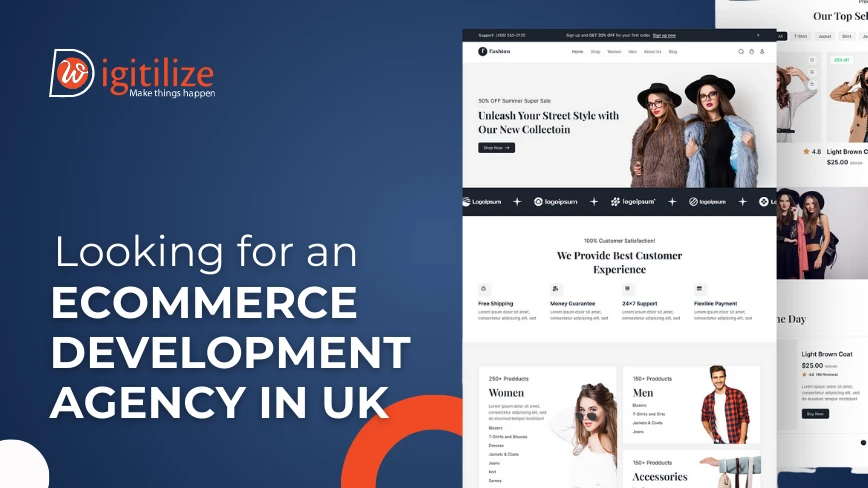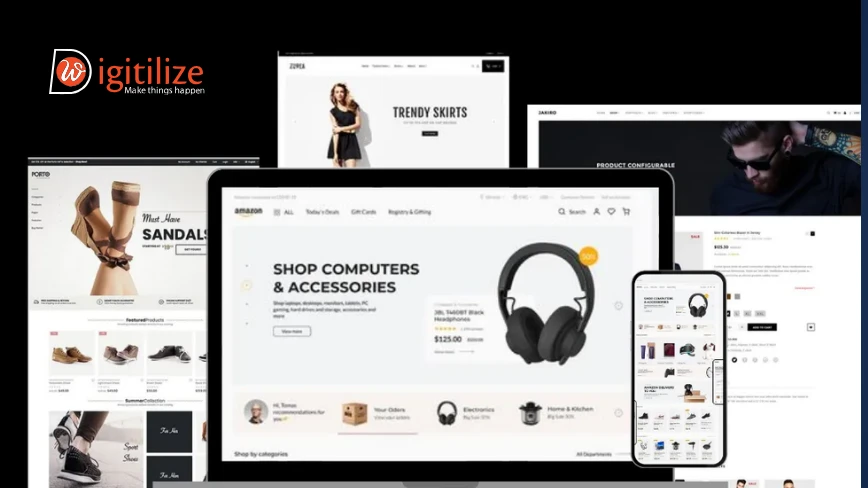Looking for an ecommerce development agency in UK
 Starting an online store is exciting, but it comes with challenges. The right ecommerce development agency helps build a seamless, scalable, and high-performing store. Many startups struggle with slow websites, complicated checkouts, and poor mobile experiences. Choosing a skilled agency ensures a smooth process, letting you focus on growing your business. This guide will explain the key factors to consider when selecting an ecommerce development agency. Also, we will ensure you make an informed choice that aligns with your business goals.
Starting an online store is exciting, but it comes with challenges. The right ecommerce development agency helps build a seamless, scalable, and high-performing store. Many startups struggle with slow websites, complicated checkouts, and poor mobile experiences. Choosing a skilled agency ensures a smooth process, letting you focus on growing your business. This guide will explain the key factors to consider when selecting an ecommerce development agency. Also, we will ensure you make an informed choice that aligns with your business goals.
Why Startups Need a Strong Ecommerce Foundation
A startup needs an online store that loads fast, looks great, and functions without issues. Customers expect easy navigation, secure payments, and a hassle-free checkout process. The right agency builds a solid foundation, ensuring long-term success.· Speed and Performance Matter
Customers leave slow websites. A well-developed store loads within two seconds. Fast performance increases conversions and improves SEO rankings. Google prioritises fast-loading sites, bringing more traffic and sales.· Mobile-Friendly Stores Win More Customers
Most people shop from their phones. A startup needs a mobile-optimised store with seamless navigation. A responsive design ensures the website adjusts to all screen sizes, improving the user experience and reducing bounce rates.· Security and Payment Gateways
Customers trust secure websites. SSL certification, data encryption, and fraud prevention features protect transactions. The right ecommerce agency ensures compliance with security standards like PCI-DSS and GDPR.Choosing the Right Ecommerce Platform for Your Startup
Every startup has different needs. The right platform depends on budget, scalability, and customisation. Here’s how to decide:· User-Friendly Interface
Startups need a platform that is easy to manage without technical knowledge. A simple backend helps update products, track orders, and manage inventory.· Customisation and Scalability
An online store should grow with the business. The right platform allows customisation, offering unique features without limitations. Scalability ensures the website handles increased traffic without slowing down.· SEO and Marketing Features
A store should rank on search engines and attract customers. Built-in Search Engine Optimization tools, blog integration, and marketing automation improve visibility. An agency ensures proper setup for long-term success.Key Features Every ecommerce Store Needs in 2025
 A startup’s success depends on features that enhance customer experience and simplify management.
A startup’s success depends on features that enhance customer experience and simplify management.
· Chatbots Driven by AI
Consumers anticipate prompt replies and chatbots driven by AI may offer round-the-clock assistance without the need for human participation. Chatbots will be much more sophisticated by 2025, providing predicted support and tailored conversations. Chatbots can comprehend and react to complicated enquiries thanks to natural language processing, or NLP. It gives chatbots access to client information so they can provide tailored answers.· Superior Customisation
Consumers anticipate individualised service. Businesses that use data to provide personalised content will have a major competitive advantage by 2025. Depending on the user’s location, preferences, or behaviour, it displays various materials. Utilise AI to provide product or service recommendations based on user history. Monitor user behaviour to send pertinent messages or offers.· Section on FAQs
Before buying anything, customers will always have questions. They want quick answers without scrolling too much or waiting for support. A clear Frequently Asked Questions (FAQ) section helps solve this. It shows that you care about their concerns and value their time.
Answer common queries upfront. This builds trust and keeps users on your site longer. Include topics like shipping, returns, sizing, or how your product works. Think of the questions your customers ask most and put those first.
In 2025, shoppers expect speed and clarity. A well-structured FAQ page improves user experience and boosts your search rankings. Google notices helpful content, and FAQs do exactly that.
Make sure the section is easy to scan. Use simple headings, short answers, and no fluff. Keep it updated regularly to reflect policy or product changes. Your FAQ page can save time for your team and your customers and increase conversions.
The Development Process: What to Expect
Understanding the eCommerce development process helps set clear expectations.· Planning and Strategy
The agency defines goals, target audience, and essential features. A wireframe and sitemap outline the store’s structure.· Design and UI/UX Development
A visually appealing and easy-to-navigate design improves engagement. Every element is optimised for conversions.· Development and Customisation
Developers build the store, integrating essential features, security protocols, and third-party services like payment gateways.· Testing and Quality Assurance
Performance testing ensures fast loading. Security checks protect data, and usability tests guarantee a smooth customer journey.· Launch and Post-Launch Support
A successful launch includes ongoing maintenance, security updates, and performance monitoring.Ecommerce Trends Startups Should Watch

· Social Business
To maximise mobile purchasing, social media is a powerful retail sales channel. According to a survey, 80% of social media traffic comes from mobile devices. Additionally, 79% of smartphone users have used their smartphones to make a transaction. Based on social commerce figures, the business, which is now worth billions of dollars, is predicted to reach $1 trillion in sales by 2028. Furthermore, the number of people using social networks worldwide jumped above four billion in 2021 and is expected to approach six billion by 2027.· Models of Subscriptions
Customers have grown more accustomed to the ease of internet buying in recent years. Because it provides a workable way to meet customers’ ongoing needs, the subscription model has emerged as one of the most popular trends in the eCommerce sector. It should come as no surprise that the subscription business is expanding at a 71% CAGR and is predicted to reach over $2 trillion by 2028.· Adaptable Payment Methods
Don’t lose customers just because your website doesn’t support their favourite payment method. In 2025, flexible payment options are a must in ecommerce.
Shoppers want fast, safe, and easy ways to pay. That’s why mobile payments are now one of the top global ecommerce trends. With most people using smartphones, offering mobile wallets, UPI, digital cards, and even Buy Now, Pay Later options can boost your sales.
Stay ahead by giving your customers more ways to pay, on any device, anytime.
· Visual and Audio Searches
Customers may now benefit from voice and visual searches thanks to AI advancements. Online buyers may use photos to search thanks to visual search. By 2028, its market value is expected to reach over $32 million, with a compound annual growth rate (CAGR) of 17.5%. By employing high-quality product images, business owners may participate in this buying trend. This increases the discoverability of your business on websites like Google and Pinterest that have a visual search function.Building an SEO-Friendly Ecommerce Store
· Optimised URLs and Metadata
Your website’s URL structure and metadata play a key role in search rankings. A clean URL with relevant keywords helps search engines and users understand what a page is about. For example, instead of a complex URL like www.store.com/product?id=1234, use www.store.com/blue-running-shoes. Metadata includes the title and description of a page. A strong title should include important keywords and be compelling to users. A meta description should be informative and encourage clicks. For example: Title: Best Blue Running Shoes for Comfort & Performance | YourStore Meta Description: Shop high-quality blue running shoes designed for comfort and durability. Get free shipping & discounts today!· High-Quality Content and Blogging
Content plays a key role in SEO. Search engines look for original, useful writing. Start with unique product descriptions. Don’t copy what the manufacturer says. Instead, write your own. Focus on the benefits and features your customers care about. Use the right keywords, but keep the tone natural.
Blogging is just as important. A good blog attracts visitors and builds trust. Share tips, guides, and updates about your products or industry. This shows you’re active and knowledgeable.
Let’s say you sell fitness gear. A post like “How to Choose the Best Running Shoes in 2025” can bring in users who are ready to buy. Keep the posts short, helpful, and packed with value.
Regular updates and smart content help your site rank higher and keep people coming back.
· Mobile Optimisation
Most people browse and shop on their phones, and Google ranks mobile-friendly websites higher. A responsive design ensures your site looks good on all screen sizes. Your store should also load quickly on mobile devices, slow pages lead to high bounce rates. To optimise for mobile:- Use a simple, easy-to-navigate layout.
- Avoid pop-ups that cover the whole screen.
- Make buttons and links easy to tap.
- Test your site on different mobile devices.
- Image Optimisation

